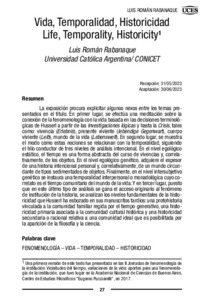Please use this identifier to cite or link to this item:
https://repositorio.uca.edu.ar/handle/123456789/18412| Título: | Vida, temporalidad, historicidad Life, temporality, historicity |
Autor: | Rabanaque, Luis Román | Palabras clave: | FENOMENOLOGIA; VIDA; TEMPORALIDAD; HISTORICIDAD | Fecha de publicación: | 2023 | Editorial: | Universidad de Ciencias Empresariales y Sociales | Cita: | Rabanaque, L. R. Vida, temporalidad, historicidad [en línea]. Revista interdisciplinaria de fenomenología. 2023 (4). Disponible en: https://repositorio.uca.edu.ar/handle/123456789/18412 | Resumen: | Resumen:
La exposición procura explicitar algunos nexos entre los temas pre sentados en el título. En primer lugar, se efectúa una meditación sobre la
conexión de la fenomenología con la vida basada en las decisiones terminoló gicas de Husserl a partir de las Investigaciones lógicas y hasta la Crisis, tales
como: vivencia (Erlebnis), presente viviente (lebendige Gegenwart), cuerpo
viviente (Leib), mundo de la vida (Lebenswelt). En segundo lugar, se muestra
el modo como estas nociones se relacionan con la temporalidad, siguiendo
el hilo conductor de tres niveles de análisis intencional. En el nivel egológico
estático, el tiempo es una forma abstracta del curso de vivencias y, correla tivamente, de los objetos. En el nivel egológico genético, adquiere el espesor
de una historia intencional personal y, correlativamente, de un mundo circun dante de tipos sedimentados de objetos. Finalmente, en el nivel intersubjetivo
genético se instaura una temporalidad interpersonal o monadológica cuyo co rrelato es el tiempo comunitario del mundo de la vida. Y en tercer lugar, puesto
que en este último tipo de análisis se gana el acceso originario al fenómeno
de institución de la historia, se analizan los niveles fundamentales de la histo ricidad que Husserl ha esbozado en sus manuscritos tardíos: una protohistoria
vinculada a la comunidad familiar regida por el tiempo generativo, una histo- ricidad primaria asociada a la comunidad cultural histórica y una historicidad
secundaria o racional relativa a una comunidad ideal que es posibilitada por
la aparición de la filosofía y la ciencia. Abstract: This paper seeks to lay out some connections among the topics proposed in the title. Firstly, a meditation is conducted that concerns the relationship between phenomenology and life on the basis of Husserl’s terminological decisions from the Logical Investigations to the Crisis, such as living experience (Erlebnis), living present (lebendige Gegenwart), living Body (Leib), and life-world (Lebenswelt). Secondly, how these notions bear a connection with temporality is shown by following three levels of inten tional analysis as a thread. At the static egologic level, time is an abstract form pertaining to the stream of consciousness and correlatively, to the ob jects. At the genetic egologic level, it acquires the thickness of a personal intentional history and correlatively, of a surrounding world of sedimented types of objects. At the genetic intersubjective level, an inter-personal or monadological temporality is established, whose correlate is communal life world time. Thirdly, since the latter level provides the originary access to the institution of history, three fundamental levels of historicity that Husserl sketches in his later manuscripts are analyzed: a primal history connected with the familiar community ruled by generative time, a primary historicity tied to a historic cultural community, and a secondary or rational history that is made possible by the emergence of philosophy and science. |
URI: | https://repositorio.uca.edu.ar/handle/123456789/18412 | ISSN: | 2718-8698 (online) | Disciplina: | FILOSOFIA | Derechos: | Atribución-NoComercial 4.0 Internacional | Fuente: | Revista interdisciplinaria de fenomenología. 2023 (4). |
| Appears in Collections: | Artículos |
Files in This Item:
| File | Description | Size | Format | |
|---|---|---|---|---|
| vida-temporalidad-historicidad.pdf | 98,8 kB | Adobe PDF |  View/Open |
This item is licensed under a Creative Commons License

